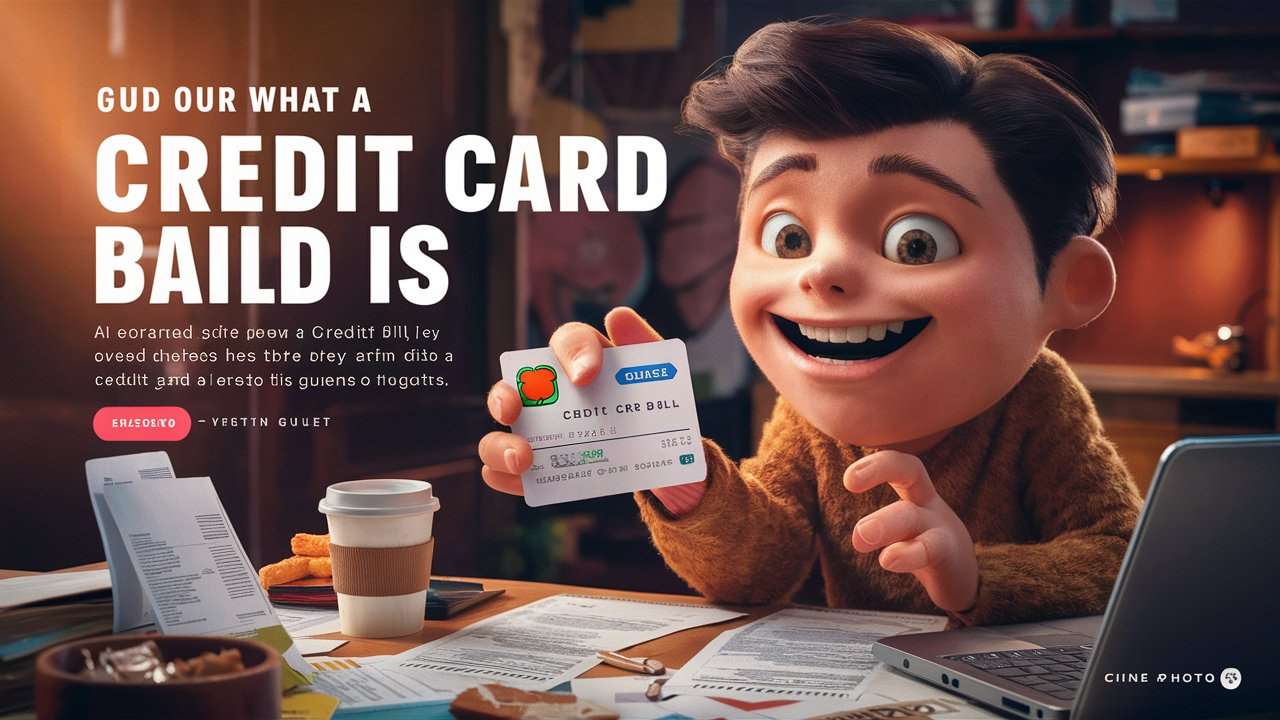The Love-Hate Relationship with Credit Card Bills
Ah, the credit card bill🤑a monthly reminder of our spending habits and, let’s be honest, sometimes a harbinger of regret. It’s a bit like that friend who always shows up at the party with a bottle of wine but also insists on telling you about their latest diet🤑exasperating yet somewhat essential. Understanding these bills can feel like deciphering ancient hieroglyphs, but fear not! This guide is here to help you navigate the labyrinth of numbers and terms that seem designed to confuse even the most astute financial wizards.

Why Understanding Your Bill Can Save You Money
Grasping the ins and outs of your credit card bill isn’t just for the financially savvy; it’s for anyone who wants to avoid becoming a victim of unnecessary charges and interest rates that grow faster than a Chia Pet. By understanding your bill, you can make informed decisions that not only keep your wallet happy but also enhance your credit score and financial future. Let’s delve deeper into this world of plastic and paper.
What Exactly Is a Credit Card Bill?
Breaking Down the Basics of Your Monthly Statement
At its core, a credit card bill is a summary of your credit card activity over the past month. It’s like a financial report card, showing how well🤑or poorly🤑you’ve managed your spending. Each month, your card issuer compiles your purchases, payments, fees, and interest into one handy document, delivered straight to your inbox or mailbox, depending on how you roll.
The Anatomy of a Credit Card Bill: What’s Inside?
Think of your credit card bill as a treasure map, leading you through the twists and turns of your financial journey. It contains your total balance, payment due date, minimum payment, interest rates, fees, and a breakdown of transactions. Some bills even feature enticing offers to make you consider taking on more debt🤑talk about a mixed message!

Key Components of a Credit Card Bill
Due Date: The Most Important Date of the Month
If your credit card bill were a movie, the due date would be the dramatic climax. Mark it on your calendar, set a reminder, or tie a string around your finger🤑whatever it takes! Missing this date can lead to late fees, interest rate hikes, and a potential dip in your credit score, transforming you from a responsible cardholder into a financial villain in mere seconds.
Minimum Payment: What Happens If You Pay Only This?
Ah, the siren song of the minimum payment. It might sound enticing🤑“Pay just this tiny amount!” But beware, paying only the minimum means you’ll be buried under a mountain of interest, like an unfortunate hero in a cautionary tale. It’s like treating a scratch with a Band-Aid while ignoring the fact that you’re losing blood🤑eventually, you’ll face the consequences.
Total Balance: The Big Number You Shouldn’t Ignore
Your total balance is the grand total of your spending spree. It’s the number that could bring you to tears or inspire a shopping spree, depending on how you look at it. Monitoring this figure can help you resist the urge to overspend and keep your financial goals in check. Remember, ignorance is not bliss when it comes to credit card bills!
Available Credit: Why This Number Matters
Your available credit is like the leftover pizza in the fridge🤑tempting but finite. It represents the credit limit minus what you’ve already spent. Keeping an eye on this number can help you avoid exceeding your limit, which might lead to fees and a potential credit score crash.

Understanding Interest Rates
APR: The Mystery Behind Annual Percentage Rate
The Annual Percentage Rate (APR) is the elusive creature lurking in the shadows of your credit card bill. It determines how much interest you’ll owe if you carry a balance. Understanding APR is essential because it can vary dramatically based on your creditworthiness. Higher APRs can turn your “free lunch” into a multi-course meal, complete with interest appetizers and penalty desserts.
How Interest Accumulates: The Snowball Effect
Imagine rolling a snowball down a hill. It starts small, but as it gathers momentum, it becomes a behemoth, and so does your interest. If you don’t pay your balance in full, interest will compound monthly, leading to a debt snowball that could bury you under a mountain of payments.
Introductory Rates: Sweet Deals or Traps?
Introductory rates are like the shiny lures used to catch fish🤑appealing at first but potentially dangerous if you bite. While they can provide lower rates for a limited time, they often revert to higher rates once the introductory period ends. Always read the fine print, or you might find yourself swimming in a sea of debt when the deal’s over.

Fees, Fees, and More Fees
Common Credit Card Fees You Should Know About
Just when you think you’ve escaped the clutches of your credit card bill, fees pop up like surprise guests at a party. From annual fees to cash advance fees, these little gremlins can add up quickly. Familiarize yourself with the common culprits to dodge them effectively.
Late Payment Fees: The Sneaky Charge That Can Bite
If missing the due date turns you into a financial villain, late payment fees are the dastardly sidekick. These sneaky charges can be hefty and are often tacked on when you least expect it, like a surprise plot twist in your favorite novel. Always aim for punctuality; your wallet will thank you.
Foreign Transaction Fees: Traveling with a Price Tag
Planning a jaunt overseas? Beware of foreign transaction fees that could sneak onto your bill like an uninvited travel companion. Some cards charge up to 3% on purchases made abroad. Check your card’s policy before packing your bags; no one wants to pay extra for the privilege of enjoying gelato in Italy!
Reading Your Credit Card Bill Like a Pro
How to Decode the Fine Print
The fine print of your credit card bill can often feel like a cryptic message from a long-lost civilization. To decode it, read each section carefully, paying attention to any terms and conditions that could impact you. Don’t shy away from using a magnifying glass if needed🤑your financial future deserves that kind of attention!
Tips for Spotting Errors on Your Statement
Mistakes happen, and your credit card statement is not immune. Look for discrepancies in transaction amounts or unfamiliar charges. If something doesn’t seem right, investigate! Credit card companies often make errors, and spotting them can save you from overpaying and potential headaches down the line.
When to Challenge Charges: Your Rights as a Consumer
If you find a charge that looks fishy, don’t hesitate to challenge it. You have rights as a consumer, and disputing erroneous charges is not only your prerogative but also your responsibility. Contact your card issuer promptly to address any discrepancies and keep your financial ship sailing smoothly.

Payment Options and Strategies
Paying in Full vs. Minimum Payments: The Ultimate Showdown
In one corner, we have paying in full, a strategy that can save you from interest charges and keep your financial health intact. In the other, minimum payments, which might seem convenient but lead you straight to the land of debt. Choose wisely, my friends; the fate of your finances rests in your hands!
Setting Up Autopay: Convenience or Risk?
Autopay can be a double-edged sword🤑convenient, yes, but it can also become a risky habit if you’re not careful. On one hand, it ensures you never miss a payment; on the other, it could lead to accidental payments for subscriptions you forgot about. Approach with caution and regularly review your spending.
Using a Payment Calendar: Keeping Track Like a Boss
Creating a payment calendar can transform you into a credit card ninja, slicing through due dates with finesse. By marking important dates, you can manage your payments and avoid late fees. Plus, it gives you a visual representation of your financial commitments🤑who doesn’t love a good calendar?
The Benefits of Timely Payments
Building Your Credit Score: The Magic of On-Time Payments
Timely payments are like fairy dust for your credit score. Each on-time payment helps build your score, improving your chances of securing better interest rates and financial opportunities down the road. Consider it an investment in your future🤑after all, who doesn’t want to look fabulous in the eyes of lenders?
Rewards Programs: Cash Back, Points, and Other Perks
Many credit cards come with enticing rewards programs, offering cash back, points for travel, or other delightful perks. Making timely payments allows you to reap these benefits without falling into debt. Just remember, the rewards are only worth it if you can pay off your balance each month!
Protecting Yourself from Interest Charges
By paying your bill on time and in full, you can protect yourself from the dreaded interest charges. It’s like wearing armor in a battle; it shields you from financial pitfalls and keeps your hard-earned money where it belongs🤑in your pocket!
What Happens If You Miss a Payment?
The Domino Effect: How One Missed Payment Affects You
Missing a payment can set off a chain reaction that resembles a game of Jenga. One misstep can lead to late fees, interest rate increases, and a potential drop in your credit score. It’s a domino effect you want to avoid at all costs.
Credit Card Companies: Friends or Foes When You’re Late?
When you miss a payment, credit card companies can feel less like friendly allies and more like fierce adversaries. However, many companies offer grace periods or options for late payments🤑just be proactive about communicating. It’s better to reach out before the situation spirals out of control.

Managing Multiple Credit Cards
Consolidating Bills: One Statement to Rule Them All Managing multiple
credit cards can feel like juggling flaming swords🤑thrilling but dangerous. Consider consolidating your bills into one statement if you can. This can simplify your payments and help you keep track of your spending without feeling like a circus performer.
Using Apps to Track Multiple Credit Cards
In the age of technology, various apps can help you track your multiple credit cards like a hawk. From payment reminders to spending summaries, these tools can be invaluable. Just ensure the app is reputable🤑your financial data deserves the best security.
Tips for Avoiding Credit Card Debt
Budgeting Basics: Knowing Your Spending Habits
Establishing a budget is the cornerstone of financial responsibility. By understanding your spending habits, you can identify areas to cut back and avoid falling into debt. Think of it as drawing a treasure map to navigate your finances, ensuring you stay on course.
Emergency Funds: Preparing for the Unexpected
Life is unpredictable, and that’s where an emergency fund comes in handy. By saving a little each month, you can create a financial buffer that prevents you from relying on credit cards when the unexpected hits. It’s like having an umbrella during a surprise rainstorm🤑always a good idea!
Using Credit Wisely: The 30% Rule
Many financial experts recommend keeping your credit utilization ratio below 30%. This means not using more than 30% of your available credit at any time. Staying below this threshold can help maintain a healthy credit score and prevent you from slipping into debt.
What to Do If You Can’t Pay Your Bill
Communicating with Your Credit Card Company
If you find yourself unable to pay your bill, don’t panic! Communicate with your credit card company🤑they’re not monsters lurking in the shadows. Many are willing to work with you to find solutions, whether it’s a temporary hardship plan or a payment arrangement.
Exploring Payment Plans and Hardship Options
If circumstances force you into a tight spot, inquire about payment plans or hardship options. Many companies offer assistance programs designed to help you navigate financial difficulties without spiraling into chaos. It’s all about being proactive and seeking support when needed.
Conclusion
Recap: Your Friendly Guide to Credit Card Bills
Navigating the world of credit card bills doesn’t have to feel like wandering through a dark forest without a flashlight. With the right knowledge and strategies, you can master your credit card finances, avoid pitfalls, and make informed decisions.
Take Control: Mastering Your Credit Card Finances
By understanding your credit card bill, recognizing key components, and adopting smart payment strategies, you can take control of your financial destiny. Remember, knowledge is power, and being proactive is the best way to stay one step ahead.
Final Thoughts: Embracing the Bill with Confidence
So, the next time that credit card bill lands in your hands, don’t fear it. Embrace it with confidence, armed with the tools and information to conquer your financial challenges. After all, you’re the hero of your own story, and every hero needs a solid game plan!
People Also Ask
Is a Credit Card Bill Monthly?
Yes, credit card bills are typically generated on a monthly basis. Most credit card issuers provide a statement at the end of each billing cycle, summarizing your transactions, payments, and any interest or fees incurred during that period.
How Can I Check My Credit Card Bill?
You can check your credit card bill in several ways:
- Online Banking: Log into your bank’s website or mobile app.
- Paper Statements: If you opted for physical statements, check your mailbox.
- Email Notifications: Many issuers send electronic statements directly to your email.
How Do I Pay a Credit Card Bill?
Paying your credit card bill can be done through:
- Online Payment: Use your bank’s website or mobile app.
- Mail: Send a check to the address provided on your bill.
- In-Person: Visit your bank or credit card issuer’s branch.
- Automatic Payments: Set up autopay for convenience.
What Is a Bill Credit?
A bill credit is an adjustment applied to your account, reducing your balance. It may come from returns, overpayments, or promotional offers, effectively giving you a credit against future charges.
What Does Credit Card Mean?
A credit card is a plastic payment card that allows you to borrow funds up to a certain limit to make purchases or withdraw cash. You agree to repay the borrowed amount, plus any applicable interest, within a specified time frame.
What Is the Meaning of Credit Bill?
A credit bill, commonly referred to as a credit card bill, is a monthly statement that details your credit card activity, including purchases, payments, interest charges, and fees for a specific billing period.
When to Pay Credit Card Bills?
Credit card bills should be paid by the due date specified on your statement. To avoid late fees and interest charges, aim to pay your bill at least a few days before this date.
What Is Debit and Credit Bill?
- Debit Bill: Refers to transactions made using a debit card, where funds are directly withdrawn from your checking account.
- Credit Bill: Refers to transactions made using a credit card, where you borrow funds to make purchases, which you must repay later.
How to Use a Credit Card?
To use a credit card:
- Swipe or Insert: Use the card at retailers or online for purchases.
- Track Spending: Monitor your expenses to avoid exceeding your credit limit.
- Pay Off Balance: Aim to pay your balance in full each month to avoid interest.
Can I Pay My Credit Card Early?
Yes, you can pay your credit card bill early. In fact, paying early can reduce your interest charges and improve your credit utilization ratio, positively impacting your credit score.
What Happens If I Don’t Pay My Credit Card for 5 Years?
If you don’t pay your credit card for five years, the account will likely go into default and may be sent to collections. This can severely impact your credit score and result in legal action or wage garnishment.
What Is the Minimum Payment on a $500 Credit Card?
The minimum payment on a $500 credit card typically ranges from 1% to 3% of the balance, plus any interest charges. For a $500 balance, the minimum payment might be around $15 to $20, depending on your issuer’s policies.
How Does a Credit Card Bill Work?
A credit card bill summarizes your spending for the billing period, including purchases, payments, fees, and interest. It tells you how much you owe, the minimum payment due, and when the payment is due, helping you manage your finances.
Is It Free to Use a Credit Card?
Using a credit card is not inherently free. While you won’t incur costs for simply using the card, you may face interest charges if you carry a balance and various fees (annual fees, late fees, etc.) depending on the card terms.
What Is the Monthly Payment on a $5000 Credit Card?
The monthly payment on a $5,000 credit card depends on the card’s interest rate and the payment terms. If you make only the minimum payment (around 1% to 3% of the balance), it could range from $50 to $150. Paying in full would mean no interest charges.









